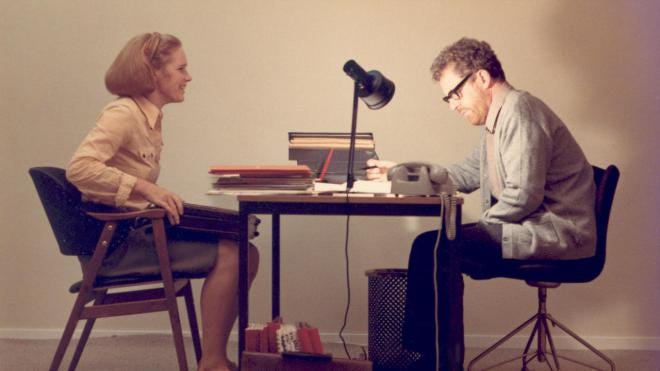A deeply intimate and immersive piece of film-making

Marriage is an ambitious venture, the true depiction of which requires an equally ambitious effort, such as that undertaken by writer/director Ingmar Bergman back in 1973. Scenes from a Marriage began as a length Swedish TV mini-series, before it was recut for theatrical release. It’s a work that is unnervingly immersive and affecting, charting the disintegration of a marriage between a couple and what eventually emerges from it. Winning the Golden Globe Award for Best Foreign Language Film, its impact on similar tales since its release is unquestionable, as is its entry to the Criterion Collection.
Synopsis
Scenes from a Marriage chronicles the many years of love and turmoil that bind Marianne and Johan, tracking their relationship through matrimony, infidelity, divorce, and subsequent partnerships. Originally conceived by director Ingmar Bergman as a five-hour, six-part television miniseries, the film is also presented in its three-hour theatrical cut. Shot largely in intense, intimate close-ups by cinematographer Sven Nykvist and featuring flawless performances by Liv Ullmann and Erland Josephson, Bergman’s emotional X-ray reveals the deep joys and pains of a complex bond.

Bergman’s feature is about the breakdown of a marriage, the process of divorce, and what is left in its stead: a lingering emotional connection. More specifically, Scenes from a Marriage tackles one of the recurring themes in his films, that of communication. What’s said, what’s unsaid, and the repercussions of both. Marianne (Liv Ullmann) and Johan (Erland Josephson) have been wed for 10 years. On the surface at least, things are going well. He is a professor, while she is a lawyer, dealing with matters that eerily pertain to family law. They have two daughters who remain unseen, and while content, an interview of the pair hints at some dissatisfaction on her part. All is (mostly) well until Johan drops a bombshell that he has fallen for someone else, and thus begins the unraveling of their marriage, with the film showing the changes as they separate, deal with the emotional highs and lows, lingering feelings, resentment, finding new partners, and eventually an acceptance, with a bond that emerges from the wreckage.
There’s a precision to how the film is constructed and unfolds, pulling this relationship and these people apart and exposing what’s beneath. Long dialogue driven sequences leave you breathless. It’s a raw, penetrative, and often exhaustive look at the subject matter. Central to it all are remarkable performances from Ullmann and Josephson. The film offers up such a wealth of material and moments that any decent actor would revel in it, but for two talents like these, they elevate it to even greater heights. They embrace aspects of these characters that do little to endear them to a viewer, but are essential to fleshing them out. Words, delivery, body language, and facial expressions, all are woven into career defining turns.
Development between these characters is often so raw, watching the film borders on the intrusive, a feeling underscored by Sven Nykvist’s stark cinematography. I recently reviewed the Criterion release of Sex, Lies, and Videotape, and watching this release brought to mind its voyeuristic aspect. The film ebbs and flows, much like a marriage is wont to do, with cuts and edits in the theatrical version piquing the curiosity to check out the full TV version. That in itself is recommended in small chunks, as the experience is not just a commitment, but a rather emotional roller-coaster that doesn’t lend itself well to a binge watch; it’s fare that you need to ruminate on rather than rush. I certainly commend Criterion for including both versions here. Whether you watch one or both versions, Bergman’s vision and insights are powerful, tracing the flawed humanity at the core of a relationship and how even if we fail at it, we can still aspire to a point where we are able to seek solace in each other’s arms.

The Package
The release is notable in that it includes both the full TV version (disc 1), running 297 minutes, and the cut released in US theaters (disc 2), running 169 minutes. The former shows a lower image quality than the latter, with heavier grain, some motion blur, and less impressive detail. The 16mm source material is all the more evident. The theatrical release disc is certainly of better quality, showing natural hues, sharper detail, and a more tempered grain. Special features are:
- Interview with director Ingmar Bergman from 1986: Taken from Swedish TV, the director talks about making the film, how he approached the characters, film’s reception, and how the TV series was recut into the theatrical experience.
- Interviews from 2003 with actors Liv Ullmann and Erland Josephson: The two leads open up about their experience making the film, as well as their careers (in front of and behind the camera) afterwards.
- Interview from 2003 with Bergman scholar Peter Cowie comparing the two versions of Scenes from a Marriage: A crash course in film editing, very interesting watch with technical and narrative insights.
- PLUS — An essay by author Phillip Lopate: Printed in the included booklet, which also features stills from the film, as well as details on the restoration and release.

The Bottom Line
Scenes from a Marriage is honest, intimate, and remarkably potent film-making. The voyeuristic approach by Bergman, combined with masterclass performances from Ullmann and Josephson, makes for an enthralling experience. A worthy entry to the Criterion collection indeed, given the excellent presentation it deserves.

Ingmar Bergman’s Scenes from a Marriage is available via Criterion from Sept 4th, 2018.


